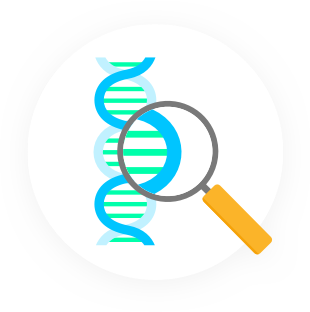Got your 23andMe or Ancestry.com DNA data?
Upload your DNA data and in less than 5 minutes you'll discover the most impactful genes—and what research suggests may be the most impactful nutritional and lifestyle insights specific to those genotypes.
How it works
 STEP 1: We take your data from a file that you upload.
STEP 1: We take your data from a file that you upload.
 STEP 2: We process your data through our system.
STEP 2: We process your data through our system.
 STEP 3: Your report is generated in less than 10 minutes.
STEP 3: Your report is generated in less than 10 minutes.
The focus of the FoundMyFitness report is on the genes I believe have the greatest influence on your healthspan—and the genetic traits that carry actual consequence.
Your report will explain what each gene’s function is, how your particular genotype may affect a gene’s function, and how this may affect healthspan strategy.
Full support right now is limited to 23andMe and Ancestry. If you're considering using either service to obtain your DNA analysis, you only need to get the basic ancestry service in order to request the FoundMyFitness genetic report.
| Supported Providers | Partial Support |
|---|---|
| 23andMe | Athletigen |
| AncestryDNA | Family Tree DNA |
| Functional Genomic Analysis | |
| Helix | |
| iGene | |
| InsideTracker | |
| Living DNA | |
| MyHeritage | |
| Self Decode | |
| StrateGeneV1 | |
| Vitagene |
* For providers under Partial Support, we recommend that you first try a basic report, which is free of charge.
Here's a demo of the report...
All entries are now conveniently tagged and searchable.

Two ways to get your Genetic Report
-
Methylation Report
-
Telomere Report
-
ApoE Report
-
Fitness Report
-
Metabolism Report
-
Micronutrient Report
-
Viral Report
-
Addiction Report
-
Klotho Report
-
Circadian Report
-
Longevity Report
-
Sweetness Preference Report
-
Cholesterol Report
with Lifetime Updates
- All Genetic Reports (see left).
-
Regularly updated with new genotypes
-
Members-only podcast
-
Members-only email
-
Members-only library
-
Regular live Q&A with Rhonda
-
FoundMyFitness T-shirt
Not ready for the comprehensive report? Try one of our free basic reports first.
This report focuses on genotypes associated with disruptions in the body's circadian rhythm that affect sleep and mood.
Many factors influence how long a person lives, such as lifestyle, dietary patterns, socioeconomic status, and access to healthcare. Genetics play a role in longevity, too. Certain SNPs have direct influence on longevity (e.g., they promote long life), while others have indirect influence (e.g., they may increase risk of certain diseases, which could shorten life). The following SNPs have been linked to longevity.
Apolipoprotein E is a class of proteins involved in the transport of fatty acids and cholesterol throughout the body and brain. Polymorphisms in this gene can affect the risk of Alzheimer’s disease and cardiovascular disease in a way that may also interact with lifestyle factors, such as diet, sleep, alcohol intake, omega-3 fatty acid status, and more.
This report is focused on SNPs related to the bioavailability and metabolism of micronutrients, which include essential vitamins, minerals, fatty acids, and amino acids that humans must obtain from their diet since they do not produce them. Micronutrients are important for short-term health but have also been shown to be important for the prevention of diseases of aging. Some of the SNPs in this report are involved in vitamins A, C, D, B12, folate, omega-3, iron and more.
This report is focused on SNPs related to telomere length. Telomeres are found at the ends of chromosomes and they protect them from degradation and damage. Telomeres shorten with age and their length is a biomarker for aging and is associated with risks for certain age-related diseases, such as cardiovascular disease. While telomere length is in part genetically determined, both environmental and lifestyle factors may play a role in delaying telomere shortening or even lengthening them.
This report is focused on SNPs relevant to cholesterol metabolism which can affect cholesterol levels. This report also focuses on HMG-CoA reductase inhibitors such as statins.
Statins are drugs that lower blood cholesterol levels by blocking the production of an enzyme in the liver called hydroxy-methylglutaryl-coenzyme A reductase (HMG-CoA reductase). Taking statins may reduce the risk of cardiovascular disease in some people.
Although statins are generally well tolerated, as many as 10 – 20 percent of people taking the drugs experience complications, including myopathy (muscle damage) or liver damage. Certain SNPs may increase the risk of experiencing complications.
Many different single nucleotide polymorphisms (SNPs) can affect how the body responds to various types of fat (ie. saturated fat, polyunsaturated fat, monounsaturated fat) and carbohydrates (ie. complex carbohydrates, simple carbohydrates).
Learn about polymorphisms that are involved in:
- Elevating blood pressure and blood glucose levels in response to high saturated fat intake
- Increasing fat deposits on the liver (fatty liver) in response to high simple carbohydrate intake
- Increasing LDL cholesterol and triglycerides in response to high in saturated fat intake
- Postprandial blood glucose levels in response to high saturated fat and simple carbohydrate intake
- Increased obesity risk and yet lower risk for cardiovascular disease with high saturated fat intake
This report is focused on SNPs related to fitness including endurance, the capacity to improve VO2max with endurance training, reduced lactate transport out of muscle and susceptibility to muscle fatigue in men, and susceptibility to injuries to soft tissues including Achilles tendon, ACL, and tennis elbow.
Genotypes related to choline and folate metabolism.